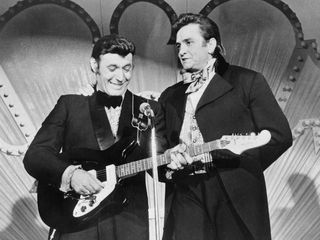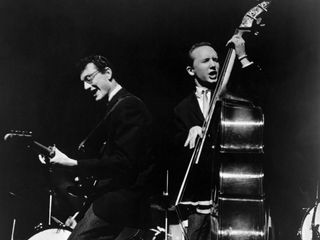The best Stratocaster players of the 1950s
Hank, Buddy and beyond

Ritchie Valens
When he died in that fateful plane crash in February 1959 aged only 17, Ritchie Valens had already achieved more than most musicians manage in a lifetime.
A pioneering figure in early rock and roll, not only did Valens record one stone-cold classic - and the best known Spanish language pop song to boot - in La Bamba, but he was an incredibly influential figure for latin rockers. Plus, he did it all playing a Stratocaster.

Ike Turner
An early rock and roller who came up through the school of hard knocks and hard playing, Ike Turner was an early innovator on the Stratocaster, and used his Fender to power his early musical innovations in the '50s.
The most important of these was Rocket 88, a song Turner cooked up with his band and recorded as Jackie Brenston and his Delta Cats. An early rock and roll smash, it kickstarted a career which saw Turner eventually become a megastar alongside his long-suffering wife Anna Mae Bullock - that's Tina Turner to you and I.

Carl Perkins
One of the earliest guitar heroes, a phenomenal songwrited and one of the driving forces behind the early sound of rock and roll, it should come as no surprise that the man who played alongside the very best - including Elvis, Johnny Cash and many more - occasionally picked up a Stratocaster.

Hank Marvin
There were perks to being the sideman of teenybopper king Cliff Richard in 1959 – not least the chance to secure one of the first Strats on British soil.
“Cliff wanted to buy me a good guitar, and we decided the Fender was the way to go,” recalls Marvin of his Fiesta Red model. “It came in a tweed case with red plush lining, and this magnificent- looking thing was just lying inside. It was like something from space, really, it was so futuristic in its design.”
By the following year, Marvin had secured his place in the Strat pantheon with The Shadows’ hit instrumental Apache, which combined an economical twanged melody with expert wobbles of the revolutionary tremolo unit to create a vibe somewhere between surf-guitar and spaghetti western.
A half-century later, that original Strat is insured for a cool £500,000 – but to the British guitar scene, it's priceless.

Buddy Holly
Buddy was taken far too soon, at the age of just 22 in an air crash on 3 February, 1959, immortalised by Don McLean as “the day the music died” in his 1971 song American Pie.
In that time, Buddy had created a rock ’n’ roll blueprint of two guitars, bass and drums that would inspire Lennon, McCartney, Dylan and The Stones.
He would do more to popularise the Stratocaster in the decade of its inception than any other artist. An accomplished guitarist, aside from his songwriting genius, Buddy brought a hybrid of rhythm and lead to fledgling rock ’n’ roll at a time when single-note guitar breaks had been popularised by the likes of Scotty Moore.
Though Fender had launched the Stratocaster three years previously, the appearance by Holly’s band The Crickets playing Peggy Sue and That’ll Be The Day on the Ed Sullivan Show on 1 December, 1957 thrust the guitar into the spotlight.
Buddy (born Charles Hard Holley) bought his Strat on 23 April, 1955 with money he loaned from his brother Larry, at Adair Music in Lubbock, Texas. He would own four more Strats (two were stolen on tour) before his death.

MusicRadar is the number 1 website for music makers of all kinds, be they guitarists, drummers, keyboard players, djs or producers...
- GEAR: We help musicians find the best gear with top-ranking gear round-ups and high- quality, authoritative reviews by a wide team of highly experienced experts.
- TIPS: We also provide tuition, from bite-sized tips to advanced work-outs and guidance from recognised musicians and stars.
- STARS: We talk to musicians and stars about their creative processes, and the nuts and bolts of their gear and technique. We give fans an insight into the actual craft of music making that no other music website can.
Most Popular








